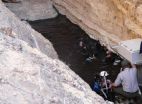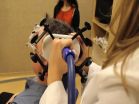(Press-News.org) NEW BRUNSWICK, N.J. – The protracted and uneven recovery from the Great Recession has led most Americans to conclude that the U.S. economy has undergone a permanent change for the worse, according to a new national study at Rutgers. Seven in 10 now say the recession's impact is permanent, up from half in 2009 when the recession officially ended, according to the John J. Heldrich Center for Workforce Development.
Among key findings in "Unhappy, Worried and Pessimistic: Americans in the Aftermath of the Great Recession," the center's latest Work Trends report, are:
Despite sustained job growth and lower levels of employment, most Americans do not think the economy has improved in the last year or that it will in the next.
Just one in six Americans believe that job opportunities for the next generation will be better than for theirs; five years ago, four in 10 held that view.
Roughly four in five Americans have little or no confidence that the federal government will make progress on the nation's most important problems over the next year.
Much of the pessimism is rooted in direct experience, according to Heldrich Center Director and Professor Carl Van Horn, co-author of the report.
"Fully one-quarter of the public says there has been a major decline in their quality of life owing to the recession, and 42 percent say they have less in salary and savings than when the recession began," Van Horn said. "Despite five years of recovery, sustained job growth and reductions in the number of unemployed workers, Americans are not convinced the economy is improving.
He added that only one in three thinks the U.S. economy has gotten better in the last year, one-quarter thinks it will improve next year and just one in six believe that job opportunities will be better for the next generation of American workers, down from four in 10 five years ago.
The Heldrich Center conducted its survey between July 24 and Aug. 3 with a nationally representative sample of 1,153 Americans.
The Work Trends analysis summarizes the effects of the Great Recession by classifying Americans into one of five categories based on how much impact the recession had on their quality of life and whether the change was temporary or permanent. It reveals that:
16 percent of the public, or 38 million people, were "devastated" because they experienced a "major, permanent" change in the quality of their life
19 percent, or 46 million, were "downsized" due to "permanent but minor" changes in standards of living
10 percent, or 24 million were "set back," experiencing "major, but temporary" changes in their quality of life
22 percent, or 53 million, were "troubled" by the recession and endured only a "minor and temporary" change
Only one in three of the nation's 240 million adults reported that they were completely "unscathed" by the recession.
Professor Cliff Zukin, co-director of the Work Trends surveys with Van Horn, said, "Looking at the aftermath of the recession, it is clear that the American landscape has been significantly rearranged. With the passage of time, the public has become convinced that they are at a new normal of a lower, poorer quality of life. The human cost is truly staggering."
Characteristics of the American worker
The public paints an extremely negative picture of the American worker as unhappy, underpaid, highly stressed, and insecure about their jobs. Asked to describe the typical American worker, using a list of a dozen words or phrases, just 14 percent checked off happy at work and only 18 percent believe they are well paid. Two-thirds say that American workers are "not secure in their jobs" and "highly stressed." Just one in five say the average American worker is well educated or innovative; just one in three checked off ambitious or highly skilled. And perhaps the most surprising, just one in three checked off that the average American worker is "better than workers in other countries."
Financial and long-term effects
One of the reasons the public does not see the economy as having gotten better is that many remain under tremendous financial stress. Six in 10 Americans describe their financial condition negatively as only fair (40 percent) or poor (19 percent). One-third report being in good shape; just 7 percent describe themselves as being in excellent financial health. Many report significant losses in the Great Recession. Just 30 percent say they have more in salary and savings than they did before the recession started, less than a third have the same, leaving 42 percent who report having less today than five years ago.
Americans view the recession as causing fundamental and lasting changes in a number of areas of economic and social life. Three in five believe the ability of young people to afford college will not return to prerecession levels, which is significant given the role that education has historically played as a key to upward mobility. Other fundamental areas where a large segment of the public sees permanent changes are: job security (53 percent), the elderly having to find part-time work after retiring (51 percent) and workers having to take jobs below their skill level (44 percent).
Pessimistic about the Future
Americans are also pessimistic about the future. Only a quarter think economic conditions in the United States will get better in the next year, and just 40 percent believe their family's finances will get better over the next year. Consequently, most do not see themselves getting back to where they were any time soon.
"Despite nearly five years of job growth and declining unemployment levels, Americans remain skeptical that the economy has improved and doubt that it will improve any time soon," said Van Horn. "The slow, uneven, and painful recovery left Americans deeply pessimistic about the economy, their personal finances, and prospects for the next generation."
The report found the public sharply critical of Washington policymakers. More disapprove than approve of the job President Obama is doing by a margin of 46 percent to 54 percent. Even fewer approve of the job Congress is doing – 14 percent. A plurality of 43 percent say they trust neither the president nor Congress to handle the economy. Finally, should Republicans win control of Congress in November, only 26 percent say this will help lower the unemployment rate. Thirty percent say this would make unemployment worse while 44 percent say it would make no difference.
INFORMATION: END
After Great Recession, Americans are unhappy, worried, pessimistic, Rutgers study finds
National survey: Most don't think economy improved last year or will improve in the next
2014-08-28
ELSE PRESS RELEASES FROM THIS DATE:
A VA exit strategy
2014-08-28
LEBANON, NH – As the federal government plans its exit strategy from the war, now may be the time for it to rethink its role in providing health care to veterans, says a Perspective piece in the New England Journal of Medicine.
"To simply go on doing more of the same is to fail to recognize the challenge that the Veterans Health Administration's cost and population structure pose in the longer run," said William Weeks, from The Dartmouth Institute for Health Policy & Clinical Practice, and David Auerbach, from the RAND Corporation, in the August issue of NEJM.
The ...
The universal 'anger face'
2014-08-28
The next time you get really mad, take a look in the mirror. See the lowered brow, the thinned lips and the flared nostrils? That's what social scientists call the "anger face," and it appears to be part of our basic biology as humans.
Now, researchers at UC Santa Barbara and at Griffith University in Australia have identified the functional advantages that caused the specific appearance of the anger face to evolve. Their findings appear in the current online edition of the journal Evolution and Human Behavior.
"The expression is cross-culturally universal, and even ...
Climate change puts endangered Devils Hole pupfish at risk of extinction
2014-08-28
RENO, Nev. – Climate change is hurting reproduction of the endangered Devils Hole pupfish, threatening the survival of this rare species that has numbered as few as 35 individuals, new research by the University of Nevada, Reno and Desert Research Institute shows.
Scientists report that geothermal water on a small shelf near the surface of an isolated cavern in the Nevada desert where the pupfish live is heating up as a result of climate change and is likely to continue heating to dangerous levels.
The hotter water, which now reaches more than 93 degrees, has shortened ...
Deadly remedy: Warning issued about Chinese herbal medicine
2014-08-28
A herbal preparation prescribed by a Chinese herbal medication practitioner in Melbourne for back pain resulted in life-threatening heart changes, prompting a team of intensive care and emergency physicians to call for appropriate patient education by practitioners who prescribe complementary medications.
Writing in Emergency Medicine Australasia, the journal of the Australasian College for Emergency Medicine, emergency medicine trainees Dr Angelly Martinez and Dr Nicky Dobos from the Intensive Care Unit at the Royal Melbourne Hospital and emergency medicine trainee Dr ...
Are cigarette substitutes a safe alternative? It depends on user habits
2014-08-28
CORAL GABLES, Fla (Aug. 26, 2014)-- Cigarette smoking kills approximately 440,000 Americans each year, according to the Centers for Disease Control and Protection. It's the leading cause of preventable death worldwide. In order to overcome this addiction, many people resort to nicotine replacement therapies.
A recent literature review study by researchers at the University of Miami (UM) suggest that small dosages of nicotine found in cigarette substitutes could be harmful to human musculoskeletal system, due to overuse. The findings are reported in the Global Journal ...
From bite site to brain: How rabies virus hijacks and speeds up transport in nerve cells
2014-08-28
Rabies (and rabies virus, its causative agent) is usually transmitted through the bite of an infected animal into muscle tissue of the new host. From there, the virus travels all the way to the brain where it multiplies and causes the usually fatal disease. An article published on August 28th in PLOS Pathogens sheds light on how the virus hijacks the transport system in nerve cells to reach the brain with maximal speed and efficiency.
Pathogens that travel in the blood can spread throughout the body without much effort, courtesy of the heart's pumping action. Those traveling ...
Genomic sequencing reveals mutations, insights into 2014 Ebola outbreak
2014-08-28
In response to an ongoing, unprecedented outbreak of Ebola virus disease (EVD) in West Africa, a team of researchers from the Broad Institute and Harvard University, in collaboration with the Sierra Leone Ministry of Health and Sanitation and researchers across institutions and continents, has rapidly sequenced and analyzed more than 99 Ebola virus genomes. Their findings could have important implications for rapid field diagnostic tests. The team reports its results online in the journal Science.
For the current study, researchers sequenced 99 Ebola virus genomes collected ...
Radio telescopes settle controversy over distance to Pleiades
2014-08-28
Astronomers have used a worldwide network of radio telescopes to resolve a controversy over the distance to a famous star cluster -- a controversy that posed a potential challenge to scientists' basic understanding of how stars form and evolve. The new work shows that the measurement made by a cosmic-mapping research satellite was wrong.
The astronomers studied the Pleiades, the famous "Seven Sisters" star cluster in the constellation Taurus, easily seen in the winter sky. The cluster includes hundreds of young, hot stars formed about 100 million years ago. As a nearby ...
New research reveals how wild rabbits were genetically transformed into tame rabbits
2014-08-28
The genetic changes that transformed wild animals into domesticated forms have long been a mystery. An international team of scientists has now made a breakthrough by showing that many genes controlling the development of the brain and the nervous system were particularly important for rabbit domestication. The study is published today in Science and gives answers to many genetic questions.
The domestication of animals and plants, a prerequisite for the development of agriculture, is one of the most important technological revolutions during human history. Domestication ...
Electric current to brain boosts memory
2014-08-28
VIDEO:
Stimulating a region in the brain with non-invasive electrical current using magnetic pulses (Transcranial Magnetic Stimulation) improves memory, reports a new Northwestern Medicine study in Science. The discovery opens...
Click here for more information.
CHICAGO --- Stimulating a particular region in the brain via non-invasive delivery of electrical current using magnetic pulses, called Transcranial Magnetic Stimulation, improves memory, reports a new Northwestern Medicine® ...
LAST 30 PRESS RELEASES:
How rice plants tell head from toe during early growth
Scientists design solar-responsive biochar that accelerates environmental cleanup
Construction of a localized immune niche via supramolecular hydrogel vaccine to elicit durable and enhanced immunity against infectious diseases
Deep learning-based discovery of tetrahydrocarbazoles as broad-spectrum antitumor agents and click-activated strategy for targeted cancer therapy
DHL-11, a novel prieurianin-type limonoid isolated from Munronia henryi, targeting IMPDH2 to inhibit triple-negative breast cancer
Discovery of SARS-CoV-2 PLpro inhibitors and RIPK1 inhibitors with synergistic antiviral efficacy in a mouse COVID-19 model
Neg-entropy is the true drug target for chronic diseases
Oxygen-boosted dual-section microneedle patch for enhanced drug penetration and improved photodynamic and anti-inflammatory therapy in psoriasis
Early TB treatment reduced deaths from sepsis among people with HIV
Palmitoylation of Tfr1 enhances platelet ferroptosis and liver injury in heat stroke
Structure-guided design of picomolar-level macrocyclic TRPC5 channel inhibitors with antidepressant activity
Therapeutic drug monitoring of biologics in inflammatory bowel disease: An evidence-based multidisciplinary guidelines
New global review reveals integrating finance, technology, and governance is key to equitable climate action
New study reveals cyanobacteria may help spread antibiotic resistance in estuarine ecosystems
Around the world, children’s cooperative behaviors and norms converge toward community-specific norms in middle childhood, Boston College researchers report
How cultural norms shape childhood development
University of Phoenix research finds AI-integrated coursework strengthens student learning and career skills
Next generation genetics technology developed to counter the rise of antibiotic resistance
Ochsner Health hospitals named Best-in-State 2026
A new window into hemodialysis: How optical sensors could make treatment safer
High-dose therapy had lasting benefits for infants with stroke before or soon after birth
‘Energy efficiency’ key to mountain birds adapting to changing environmental conditions
Scientists now know why ovarian cancer spreads so rapidly in the abdomen
USF Health launches nation’s first fully integrated institute for voice, hearing and swallowing care and research
Why rethinking wellness could help students and teachers thrive
Seabirds ingest large quantities of pollutants, some of which have been banned for decades
When Earth’s magnetic field took its time flipping
Americans prefer to screen for cervical cancer in-clinic vs. at home
Rice lab to help develop bioprinted kidneys as part of ARPA-H PRINT program award
Researchers discover ABCA1 protein’s role in releasing molecular brakes on solid tumor immunotherapy
[Press-News.org] After Great Recession, Americans are unhappy, worried, pessimistic, Rutgers study findsNational survey: Most don't think economy improved last year or will improve in the next



